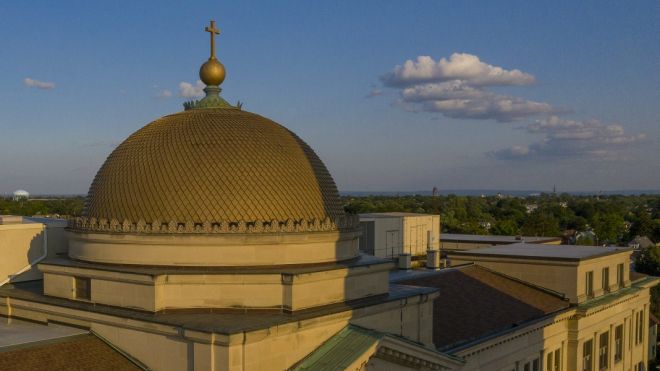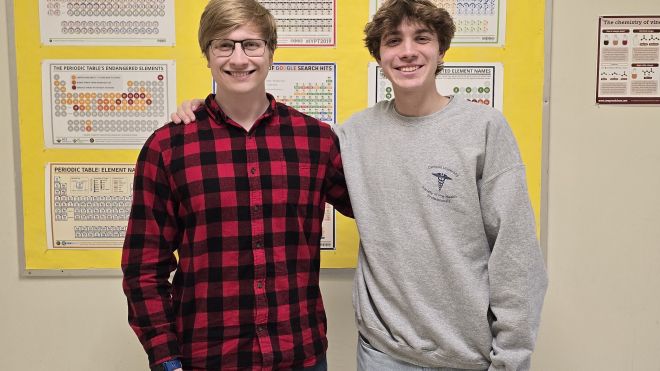
Buffalo, NY - When Courtney Lyons walked across the stage at Canisius University's commencement ceremony this spring, she carried with her more than just a diploma. She brought the culmination of transformative relationships, rigorous academic preparation, and a deepened sense of purpose that would soon take her to one of the nation's most prestigious law schools: the University of Notre Dame.
For Lyons, the path to Notre Dame wasn't just about academic achievement—it was about discovering her calling through the distinctive mentorship and Jesuit values that define the Canisius experience.
At the heart of Lyons' success story lies a truth that sets Canisius apart: the profound impact of faculty mentorship. Her relationship with Dr. Bruce Dierenfield, professor emeritus of history, exemplifies the transformative power of personal investment in student success.
"I write truthfully and mean wholeheartedly that I would not have been accepted to Georgetown University Law Center without Dr. Dierenfield," Lyons reflects. Their weekly meetings, initially focused on research into the life of martyred civil rights leader Reverend George W. Lee from Belzoni, Mississippi, evolved into something far more significant than academic collaboration.
Dierenfield didn't just teach Lyons about historical research—he invested in her personal growth, encouraging her to join campus organizations, build networks, and maintain the relationships that sustain a meaningful life. His guidance helped her understand that success isn't just about academic achievement, but about developing as a whole person.
The impact of this mentorship extends beyond Lyons herself.
Dierenfield's track record speaks volumes about the quality of mentorship at Canisius: his former research assistants include a current Harvard Law School candidate and an Emory Law School graduate now clerking for a federal judge.
Professor John Kryder provided another pivotal influence, opening doors to creative and analytical thinking that would prove essential for law school preparation. In his Honors First Year Seminar and Law and Literature courses, Lyons discovered a different kind of learning—one that valued her thoughts, analyses, and unique perspective over rote memorization.
"Professor Kryder opened my first door to creative freedom," Lyons notes. This intellectual liberation allowed her to explore complex topics like the intersection of law and literature, ultimately leading to a presentation on Heather Ann Thompson's "Blood in the Water" about the 1971 Attica Prison Riot—work that would later inform her passion for criminal justice reform.
While mentorship provided the foundation, Canisius's rigorous academic programs prepared Lyons for the demands of elite legal education. Professor Robert Klump's American Constitutional Law courses proved particularly valuable, structured as quasi-law school classes complete with case law readings, case brief assignments, and hypothetical exam questions that Notre Dame students would recognize.
"His passion for the law was infectious and only increased my desire to attend law school," Lyons recalls.
Her undergraduate honors thesis, "The Salary Equalization Movement: Gladys Noel Bates, the NAACP, and Racial Justice for Black Teachers in Mississippi," demonstrated her ability to conduct sophisticated legal and historical research. Working with primary sources from the Library of Congress NAACP archives and examining correspondence from legal luminaries like Thurgood Marshall and Constance Baker Motley, Lyons crafted a comprehensive analysis of Mississippi's first civil rights case in 1948.
The connection between Canisius and Georgetown runs deeper than academic preparation—both institutions share a commitment to Jesuit values that emphasize service to others and the pursuit of justice. This shared foundation has shaped Lyons' career aspirations in profound ways.
Reading Bryan Stevenson's "Just Mercy" in Professor Kryder's Law and Literature course proved to be a defining moment. Stevenson's work with the Equal Justice Initiative, representing falsely convicted individuals and those imprisoned at young ages, resonated deeply with Lyons' growing commitment to social justice.
"The true measure of our character is how we treat the poor, the disfavored, the accused, the incarcerated and the condemned"—Stevenson's words, which Lyons keeps prominently displayed at her desk, capture the essence of what her Jesuit education has instilled: a commitment to serving those who need it most.
Lyons' advice to incoming students reflects the unique advantages of Canisius's intimate academic environment: "Take advantage of Canisius' size!" The personal attention from faculty, the ability to build genuine relationships with professors, and the opportunities to engage deeply in multiple activities create conditions for exceptional growth.
Her involvement in MUNDO (Model United Nations), the Griffin Newspaper, Phi Alpha Delta law fraternity, and mock trial provided practical experience in advocacy, communication, and leadership. The Canisius Earning Excellence Program (CEEP) connected her with meaningful research opportunities, while the Desmond Law Society introduced her to a network of Canisius alumni lawyers eager to mentor the next generation.
As Lyons prepares to begin her studies at the University of Notre Dame Law School, she carries with her the intellectual rigor, personal growth, and commitment to service that define both Jesuit institutions. Her aspiration to work in non-profit criminal defense, particularly with organizations like the Equal Justice Initiative, reflects how her Canisius education has shaped not just her career goals, but her understanding of law as a tool for justice.
"What I do unequivocally know is that serving people will be my priority," Lyons states with the conviction that comes from four years of Jesuit formation.
From the weekly mentorship sessions with Dr. Dierenfield to the creative freedom discovered in Professor Kryder's classroom, from rigorous constitutional law preparation to transformative service experiences, Lyons' journey illustrates the distinctive value of a Canisius education. Her acceptance to Notre Dame represents not just personal achievement, but validation of an educational approach that develops the whole person—intellectually, personally, and morally.
As she transitions from one Jesuit institution to another, Courtney Lyons embodies the mission both schools share: preparing leaders who will use their talents in service of others, particularly those who need advocacy most. Her story stands as a testament to the transformative power of education rooted in Jesuit values and the personal relationships that make such transformation possible.



